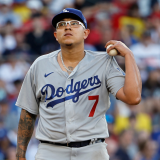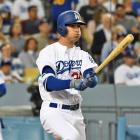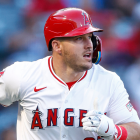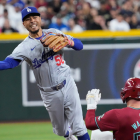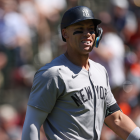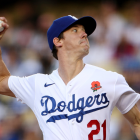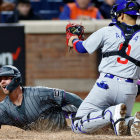The Dodgers called their top hitting prospect, 21-year-old slugger Cody Bellinger, up to the majors April 25. Dodgers center fielder Joc Pederson had just hit the disabled list with a minor groin strain, giving Bellinger a few days to get his feet wet in the Show, before being returned to the minors.
A funny thing happened on the way to all that: Bellinger started mashing. After going 1 for 10 in his first three big-league games, he banged out two hits and drew a walk April 28 against the Phillies. The next day came the explosion: Starting in his fifth straight game, Bellinger launched two homers, the second one a bomb off the foul pole in right that helped key an incredible three-run, ninth-inning comeback on back-to-back-to-back Dodger homers.
In the meantime, Adrian Gonzalez was struggling terribly. The 35-year-old first baseman and once prolific power hitter had seen his production run dry. Through his first 29 games, Gonzalez batted .255, slugged just .309 and failed to hit a single ball over the fence. Plagued by both forearm tendinitis and a herniated disc in his back, Gonzalez admitted he was in considerable pain, and wasn't well equipped to play.
Pederson returned from the disabled list Friday. But rather than send Bellinger back to the minors, the Dodgers instead put Gonzalez on the 10-day DL. That night, Bellinger annihilated the Padres, blasting two more home runs. The next night, he homered again, launching a grand slam on a pitch that was very nearly at his damn neck.
Bellinger grand slam again. 0-2. He don't give a fudge. Make it work. pic.twitter.com/3YmLrz94Oc
— Ryan Parker (@RA_Parker) May 7, 2017
Bellinger did all that while playing his natural position of first base -- which also happens to be Gonzalez's position. All of which leads to this: The Dodgers are soon going to face a dilemma. When their five-time All-Star first baseman returns to full health, he'll of course want to reclaim his old job. On the other hand, the Dodgers also have one of the most electrifying young players in baseball smashing everything in sight. It's enough to make baseball historians utter one of the most lamentable names in sports history: Wally Pipp.
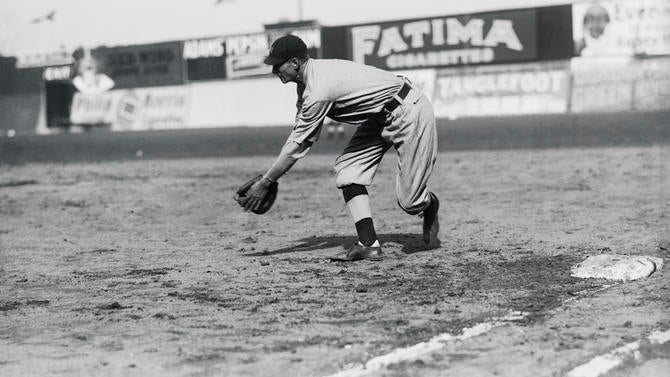
For much of his career, Pipp was one of the best hitters in the American League. After breaking into the majors in 1913 with the Tigers, Pipp landed with the Yankees, where he twice led the AL in homers (hitting 12 and nine... homer totals were very different in the Deadball Era). He knocked in 100 or more runs three times in New York and twice finished in the top 15 in MVP voting. He was durable too, six times topping 150 games played at a time when a full season lasted 154.
Then came the 1925 season. Through the first 42 games of the year as the Yankees starting first baseman, Pipp hit just .244/.295/.372. Meanwhile the Yankees were buried in seventh place in the eight-team AL, which made manager Miller Huggins antsy. For the first time that season, Huggins benched Pipp. In his stead, Huggins tapped a young Columbia grad named Lou Gehrig to play first. Gehrig impressed that night, banging out three hits. That was game two (Gehrig had pinch-hit the game before to start the streak) of what would prove to be a record-breaking run of consecutive games, with Gehrig playing 2,130 straight, establishing himself as one of the greatest players of all time and earning the nickname "The Iron Horse." Pipp never started another game at first base for the Yankees, landed with Cincinnati the next season, played three more years in the big leagues, then called it a career.
There have been a few scattered cases over the years of other Pipp-like situations that resembled the original. In some of those cases, the decision to replace the venerable veteran worked out terribly. At the start of the 1953 season, seven-time All-Star Dom Dimaggio lost his job as Red Sox center fielder to a rookie named Tom Umphlett. That year, Umphlett finished second in Rookie of the Year, voting, despite an unimpressive .283/.331/.376 batting line. His performance tanked the next season, and Umphlett played his final major-league game in 1955, at 24. Meanwhile, DiMaggio appeared in just three more games after losing his job (all as a pinch-hitter), then abruptly retired after his final game on May 9, 1953.
As for Pipp himself, writer Paul Semendinger's account of the story refutes the oft-told tale of Pipp being a malingerer who sat that fateful night because of a supposedly minor headache. Pipp did in fact experience headaches that season, but those stemmed from a severe concussion obtained as a result of a beanball during batting practice on July 2, 1925 -- a month after Gehrig took Pipp's spot in the lineup.
While different historians have disagreed about the Pipp/Gehrig story, Pipp has nonetheless become widely known as the guy who lost his job, to the point that "getting Pipped" has become a phrase that has spread throughout baseball, and even beyond the game. In his accounting of the story, writer Lyle Spatz spun the headache yarn to help explain Pipp's benching. He then quoted former MLB outfielder turned Dodgers manager Dave Roberts, who after leaving an April 25, 2003, game with an injured hamstring, told the press: "I don't want to be Wally Pipp."
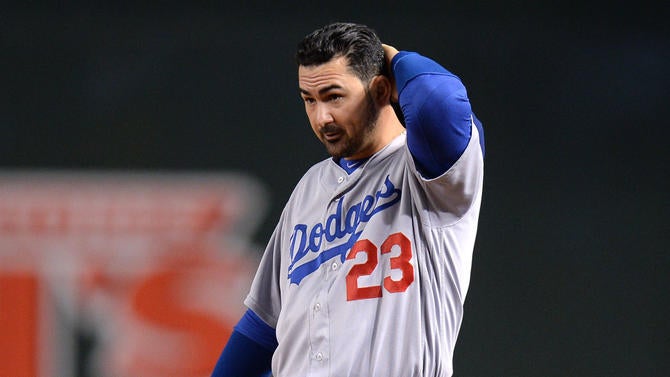
So will Gonzalez get Pipped? He very well might.
Gonzalez will make $21.5 million this season, plus the same amount in 2018. The current Dodgers regime hasn't been shy about eating big contracts, in some cases swallowing far bigger amounts than what's owed to Gonzalez. If Bellinger keeps hitting the way he has (he's at .320/.392/.680 after knocking in the game-tying run in the ninth Tuesday night against the Pirates), there's no way the Dodgers could in good conscience send him back down.
Some teams screw around with a top prospect's service time to save some money. Others get stubborn about keeping top prospects in the minors, claiming they need to make one more mysterious, infinitesimally small adjustment before they can ascend to the big leagues for good. The Dodgers have no such budget restrictions. They own one of the longer World Series droughts of any big-market franchise, having failed to win it all since 1988. And they have a truly superlative prospect in Bellinger.
Tuesday night's injury to starting left fielder Andrew Toles might've subtly saved Gonzalez's job, since Bellinger could move back to the outfield to replace Toles, thus allowing Gonzalez to reclaim his starting gig once he returns from the DL. But if the Dodgers believe that Gonzalez's first month of the season was a true barometer of his current ability level, they would likely shop for another lineup upgrade anyway, especially if Toles can't answer the bell.
If Gonzalez can't live up to his previous standards when he comes back, the Dodgers' analytically minded front office wouldn't let mushy sentiment dictate their decisions. The result could be a modern-day Pipping.












